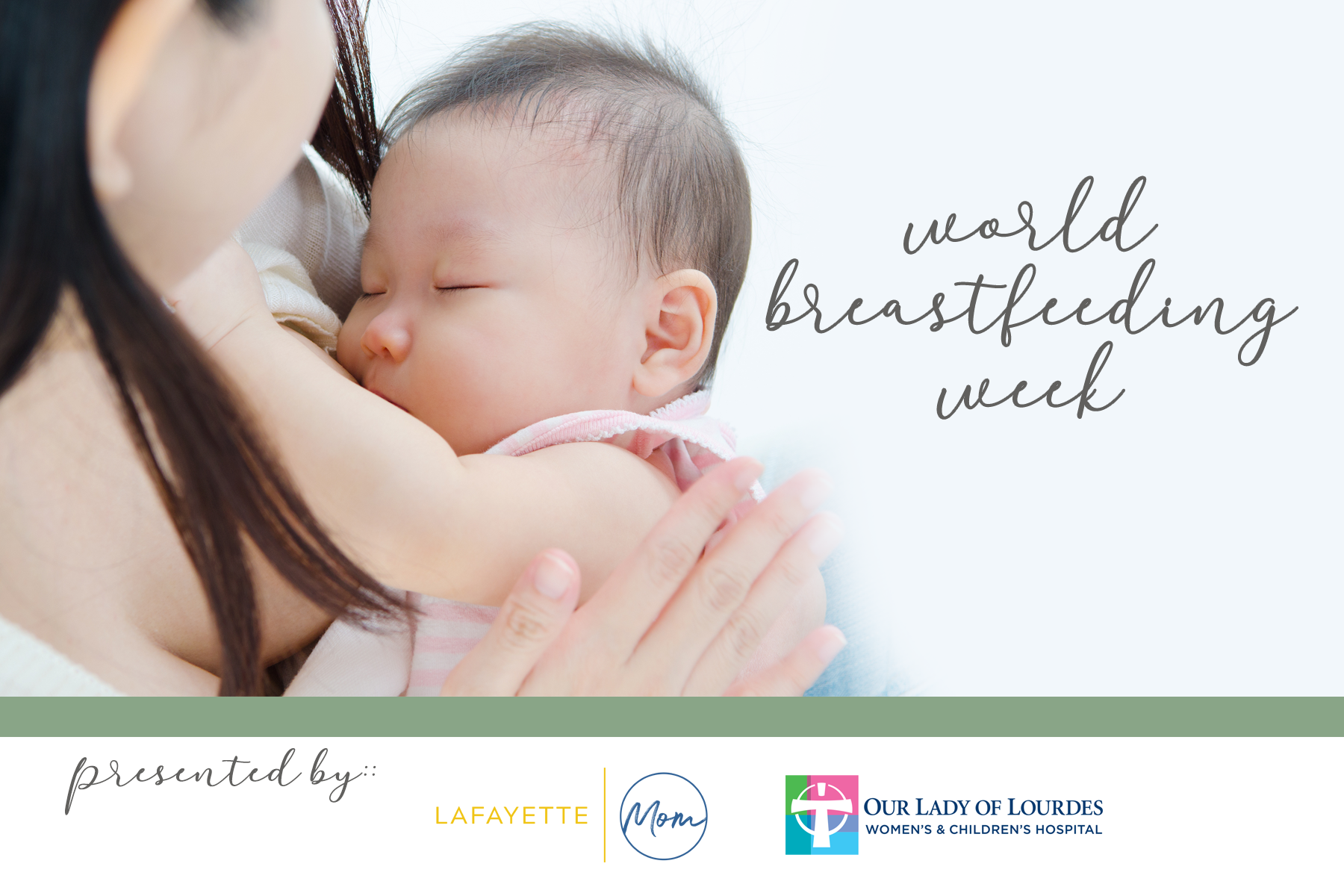Disclosure :: This post is part of a series for World Breastfeeding Week and is sponsored by Our Lady of Lourdes Women’s & Children’s Hospital.
Breastfeeding Frustrations Don’t Have to Be So Frustrating
Let’s face it, not every mom has all the answers when it comes to breastfeeding. Even seasoned pros sometimes need a refresher or learn a new tip that will do the trick. So, if you’re having some setbacks breastfeeding your little one, it’s perfectly normal. Here are some common concerns moms like you often share.
Is it normal for my baby to spit up after feedings?
Many infants will spit up a little after some — or even all — feedings or during burping because their digestive tracts are immature. That’s perfectly normal. As long as your baby is growing and gaining weight and doesn’t seem uncomfortable with the spitting up, it’s OK. The amount of spit up often looks more than it actually is. But, spitting up isn’t the same as forcefully vomiting all or most of a feeding.
If you’re concerned that your baby is vomiting, call your doctor. Try to keep a record of exactly how often and how much your baby seems to be vomiting or spitting up. In rare cases, there may be an allergy, digestive problem or other problem that needs medical attention.
If the doctor says your baby’s spitting up is normal, here are some things you can do:
- Burp your little one when he or she comes off each breast or after every one-to-two ounces during bottle feeds.
- Keep your baby upright after feedings — holding the baby is best, since the position of the baby in an infant seat may actually make spitting up more common.
- Don’t jiggle, bounce or actively play with your baby right after feedings.
- Raise the head of your baby’s crib or bassinet. Roll up a few small hand towels or receiving blankets (or you can buy special “blocks”) to place under (not on top of) the mattress. But don’t use a pillow under your baby’s head. Make sure the mattress doesn’t fold in the middle and that the incline is gentle enough so the baby doesn’t slide down.
If your baby also gets bottles of breast milk or infant formula supplements:
- Don’t give the bottle while your little one is lying down.
- Make sure the hole in the nipple is the right size and/or flow for your baby. For example, fast-flow nipples may cause babies to gag or may simply give them more than they can handle. Many breastfed babies do well with the slow-flow nipple until they are 3 months old, or even older.
It’s also important to keep in mind that this, too, shall pass. Many babies outgrow spitting up by the time they’re sitting up.
I think I’m getting sick. Can I still breastfeed?
In most cases, yes — the majority of illnesses are not dangerous to a breastfeeding infant. If you aren’t feeling well, remember that as your body produces antibodies to fight an illness, those antibodies go to the baby through your breast milk.
Contact a lactation consultant before you interrupt breastfeeding because of an illness or because of a medicine that you require. In most cases, interrupting breastfeeding is not necessary.
My baby bites during breastfeeding. Can I stop it?
Babies will often play with their mothers’ nipples with their gums, not meaning to cause any harm. But, once they start teething, a baby might bite, not knowing this is hurting mom. Giving the baby something hard and cold to chew on before the nursing will help the gums — then gums won’t be as tender, which may reduce biting.
You often can tell when your baby’s about ready to bite — usually when he or she is satisfied and starting to pull away from your breast. Pull your baby closer to you to make it more difficult for him or her to pull off easily. Or, break the suction by slipping your finger into the corner of his or her mouth. Try and react calmly and without raising your voice so the baby doesn’t get scared.
My baby doesn’t want to nurse. What’s going on?
Breastfeeding “strikes” are very normal and often last only a few days. The doctor can check your baby’s weight gain to make sure they’re getting enough to milk. Still, a strike can be worrisome, especially in a baby who usually breastfeeds with no problems at all.
So, why might your child suddenly stop wanting to breastfeed?
- Teething has made the baby’s gums sore.
- You smell “different” to your baby because you switched your soap, perfume, deodorant or lotion.
- There is a different taste to your breast milk because of a change in your diet.
- Something is making breastfeeding painful or uncomfortable, such as an ear infection, a stuffed-up nose, a cut in your little one’s mouth or an oral infection called thrush.
Until your nursing schedule is back to normal, you’ll need to pump or hand express to keep your milk supply up and to make sure the baby is getting enough to eat. And, if your child is really ready to stop breastfeeding (or wean), he or she will probably do it over a period of weeks or months.
 About Dr. Erin Hemsell, OB-GYN
About Dr. Erin Hemsell, OB-GYN
 Dr. Erin Hemsell is an OB-GYN with Women’s & Children’s Hospital. Learn more HERE.
Dr. Erin Hemsell is an OB-GYN with Women’s & Children’s Hospital. Learn more HERE.



















Thank you for sharing some helpful ideas on breastfeeding babies! Truly Mom’s are amazing on how they handle breastfeeding even if sometimes its get frustrating.